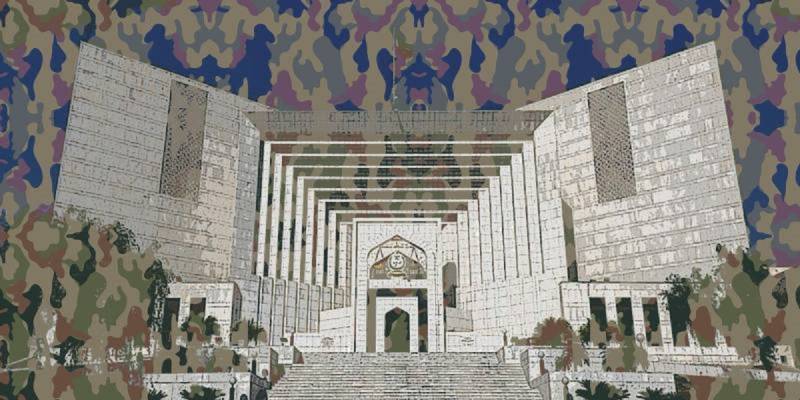
The Supreme Court on Wednesday referred the matter of trying in military courts those civilians involved in the May 9 incidents to the three-judge committee for reconstituting the bench which will hear the case.
The matter was referred to the three-judge committee, formed under the Supreme Court Practice and Procedure Act 2023 for cases filed under Article 184(3), after appellants filed against a judgment of the top court, wherein the court had declared trials of civilians as illegal. The appellants objected to the six-member bench.
A six-member larger bench, headed by Justice Aminuddin Khan, had previously heard the case. Other members of the bench included Justice Muhammad Ali Mazhar, Justice Hassan Azhar Rizvi, Justice Shahid Waheed, Justice Musarrat Hilali and Justice Irfan Saadat Khan.
During the hearing, the petitioner, former chief justice of Pakistan, Justice (retired) Jawad S Khawaja's lawyer, Khawaja Ahmad Hasan, argued that a larger bench should be constituted in light of Justice Mansoor Ali Shah and Justice Yahya Afridi's notes.
He further contended that a larger bench, comprising at least nine judges, should be formed to hear this case.
Hasan argued that the real question is whether civilians can be tried in military courts.
During Wednesday's hearing, Attorney General for Pakistan (AGP) Mansoor Usman Awan informed the court that 20 people who had completed their sentences (after the Chief of Army Staff commuted parts of their sentences) were released before Eidul Fitr.
Justice Rizvi asked whether records of the military court's verdicts had been submitted to the court.
Justice Waheed pointed out that the military court's verdict would reflect the procedure adopted during the trial.
Justice Mazhar remarked that the bench wants to see whether the military courts granted suspects access to lawyers of their choice.
One of the petitioners, senior lawyer Aitzaz Ahsan, said the court did not issue certificates to those who had spent a year in custody. The bench remarked that there are no such certificates to give out.
Advocate Hasan informed the bench that Justice Yahya had expressed his opinion in a note that a six-member bench cannot decide this case.
However, Justice Mazhar observed that Justice Yahya's opinion cannot be called a judicial order which had to be acted on.
Advocate Hassan argued how civilians could be tried in military courts, adding that the FB Ali case should be re-examined.
During Wednesday's hearing, Justice Waheed questioned what would happen if the three-judge committee decides that the same bench should hear the appeals.
Advocate Salman Akram Raja argued that in such a situation, they will concede to the committee's decision.
The court also witnessed an emotional scene when Pakistan Tehreek-e-Insaf (PTI) founder Imran Khan's relative and senior analyst Hafeezullah Niazi took the rostrum and informed the bench that his son, Hassan Niazi, remains missing and that he has been unable to meet him.
Upon hearing this, the top court asked him to meet with the AGP and directed the AGP to hear Niazi's grievance.
Later, the top court adjourned further hearings for a date-in-office.

